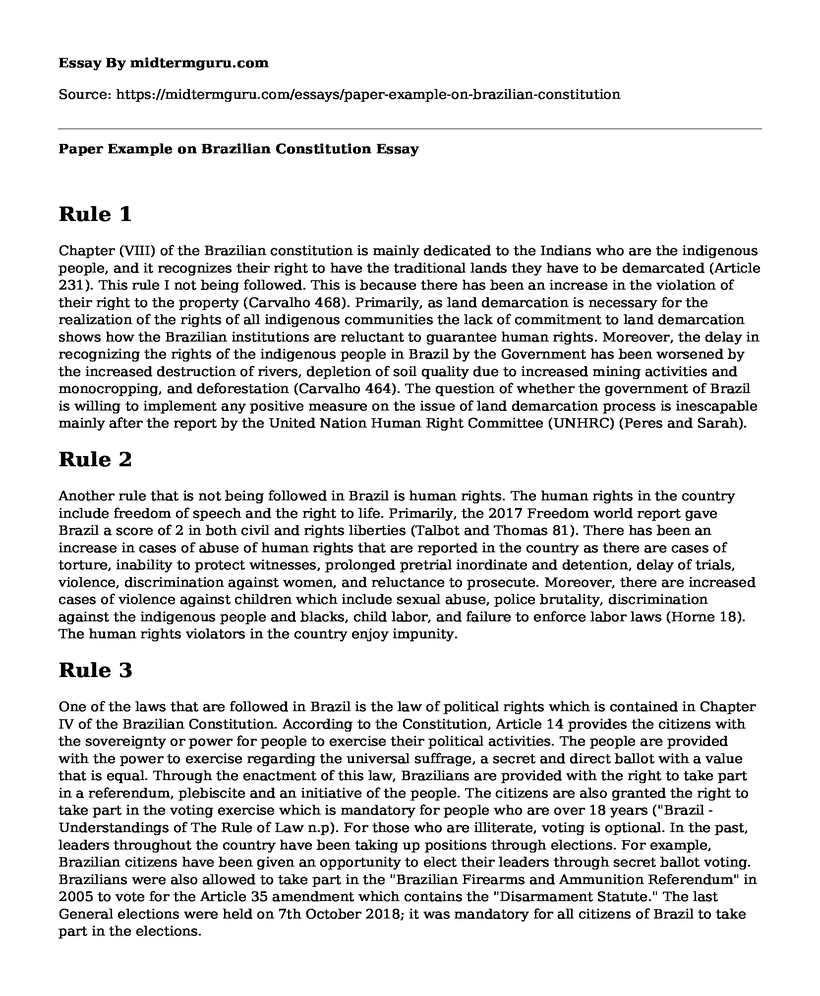Rule 1
Chapter (VIII) of the Brazilian constitution is mainly dedicated to the Indians who are the indigenous people, and it recognizes their right to have the traditional lands they have to be demarcated (Article 231). This rule I not being followed. This is because there has been an increase in the violation of their right to the property (Carvalho 468). Primarily, as land demarcation is necessary for the realization of the rights of all indigenous communities the lack of commitment to land demarcation shows how the Brazilian institutions are reluctant to guarantee human rights. Moreover, the delay in recognizing the rights of the indigenous people in Brazil by the Government has been worsened by the increased destruction of rivers, depletion of soil quality due to increased mining activities and monocropping, and deforestation (Carvalho 464). The question of whether the government of Brazil is willing to implement any positive measure on the issue of land demarcation process is inescapable mainly after the report by the United Nation Human Right Committee (UNHRC) (Peres and Sarah).
Rule 2
Another rule that is not being followed in Brazil is human rights. The human rights in the country include freedom of speech and the right to life. Primarily, the 2017 Freedom world report gave Brazil a score of 2 in both civil and rights liberties (Talbot and Thomas 81). There has been an increase in cases of abuse of human rights that are reported in the country as there are cases of torture, inability to protect witnesses, prolonged pretrial inordinate and detention, delay of trials, violence, discrimination against women, and reluctance to prosecute. Moreover, there are increased cases of violence against children which include sexual abuse, police brutality, discrimination against the indigenous people and blacks, child labor, and failure to enforce labor laws (Horne 18). The human rights violators in the country enjoy impunity.
Rule 3
One of the laws that are followed in Brazil is the law of political rights which is contained in Chapter IV of the Brazilian Constitution. According to the Constitution, Article 14 provides the citizens with the sovereignty or power for people to exercise their political activities. The people are provided with the power to exercise regarding the universal suffrage, a secret and direct ballot with a value that is equal. Through the enactment of this law, Brazilians are provided with the right to take part in a referendum, plebiscite and an initiative of the people. The citizens are also granted the right to take part in the voting exercise which is mandatory for people who are over 18 years ("Brazil - Understandings of The Rule of Law n.p). For those who are illiterate, voting is optional. In the past, leaders throughout the country have been taking up positions through elections. For example, Brazilian citizens have been given an opportunity to elect their leaders through secret ballot voting. Brazilians were also allowed to take part in the "Brazilian Firearms and Ammunition Referendum" in 2005 to vote for the Article 35 amendment which contains the "Disarmament Statute." The last General elections were held on 7th October 2018; it was mandatory for all citizens of Brazil to take part in the elections.
Rule 4
Another law that is followed in Brazil is the right to health. Brazilians have the right to social welfare which is outlined in the constitution, and that has provisions for all people to have access to health care. According to Article 196 in the Brazilian Constitution, the state has the mandate to ensure that all people have access to the right to health using economic and social policies (Brazilian Constitution N.p). An example of the way this rule is followed is by looking at the health reforms which are being implemented throughout the country. The government has developed structures which are aimed at ensuring that the risk of illness throughout the country is reduced (Atun et al., 1232). The government has also been funding hospitals and providing medicine to make sure that all individuals access quality health care.
Work Cited
Atun, Rifat, et al. "Health-system reform and universal health coverage in Latin America." The Lancet 385.9974 (2015): 1230-1247.
Brazil Constitution dredf.org. N.p., 2018. Web. 5 Dec. 2018.
"Brazil - Understandings of The Rule of Law - Wikis Der Freien Universitat Berlin." Wikis.fu-berlin.de. N.p., 2018. Web. 5 Dec. 2018.
Carvalho, Georgia O. "The Politics of Indigenous Land Rights in Brazil." Bulletin of Latin American Research, vol. 19, no. 4, 2000, pp. 461-478. JSTOR, JSTOR, www.jstor.org/stable/3339531.
Horne, John. "Understanding the denial of abuses of human rights connected to sports mega-events." Leisure Studies 37.1 (2018): 11-21.
Talbot, Adam, and Thomas F. Carter. "Human rights abuses at the Rio 2016 Olympics: activism and the media." Leisure Studies 37.1 (2018): 77-88.
Cite this page
Paper Example on Brazilian Constitution. (2022, Oct 20). Retrieved from https://midtermguru.com/essays/paper-example-on-brazilian-constitution
If you are the original author of this essay and no longer wish to have it published on the midtermguru.com website, please click below to request its removal:
- Women That Are Denied of the Basic Human Rights in Republic of Gilead
- Case Study: Fisher vs The University of Texas at Austin
- Illegal Gambling - Essay Example
- Introduction to Criminal Justice Essay Sample
- Essay Sample on Advantages of Keeping Offenders in Prison Environment
- Importance of Funding a Rehabilitative Program for Offenders in NC - Essay Sample
- Legislation Impacting America's Education System: A Deaf Education Overview - Essay Sample







